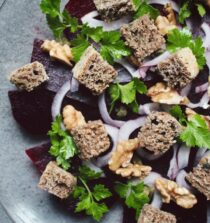The vegan keto diet plan is a specialized eating regimen that combines the principles of veganism and the ketogenic diet. It is characterized by high fat intake, moderate protein consumption, and very low carbohydrate intake, all derived exclusively from plant-based sources. This diet aims to induce and maintain a state of ketosis, where the body primarily uses fat for energy instead of carbohydrates.
Typically, the macronutrient breakdown for a vegan keto diet consists of 70-75% calories from fat, 20-25% from protein, and 5-10% from carbohydrates. Key food sources include avocados, nuts, seeds, coconut oil, and low-carb vegetables. The diet excludes all animal products and high-carbohydrate foods such as grains, legumes, and most fruits.
Adherents to this diet must carefully plan their meals to ensure adequate nutrient intake while maintaining ketosis. The vegan keto diet may offer benefits such as weight loss and improved metabolic health. It also aligns with environmental concerns associated with plant-based diets.
However, due to its restrictive nature, it can be challenging to follow and may require close attention to nutritional needs.
Key Takeaways
- The ultimate vegan keto diet plan focuses on high-fat, low-carb, and moderate-protein foods from plant-based sources.
- Benefits of the vegan keto diet include weight loss, improved blood sugar control, and reduced risk of heart disease.
- Foods to eat on a vegan keto diet include avocados, coconut oil, nuts and seeds, non-starchy vegetables, and plant-based protein sources like tofu and tempeh.
- Foods to avoid on a vegan keto diet include grains, legumes, starchy vegetables, and most fruits due to their high carbohydrate content.
- A sample vegan keto meal plan may include dishes like avocado and arugula salad, coconut curry with tofu, and a chia seed pudding for dessert.
Benefits of the Vegan Keto Diet
The vegan keto diet offers a wide range of potential health benefits for those who follow it. One of the primary benefits of the vegan keto diet is weight loss. By reducing carbohydrate intake and increasing healthy fat consumption, the body is encouraged to burn fat for fuel, leading to weight loss.
Additionally, the vegan keto diet may help improve metabolic health by reducing insulin resistance and promoting stable blood sugar levels. This can be particularly beneficial for individuals with type 2 diabetes or those at risk for developing the condition. Furthermore, the vegan keto diet may also support heart health by reducing levels of triglycerides and LDL cholesterol while increasing levels of HDL cholesterol.
In addition to these physical health benefits, the vegan keto diet may also offer mental health benefits. Some research suggests that ketogenic diets may have neuroprotective effects and could potentially help improve symptoms of conditions such as epilepsy, Alzheimer’s disease, and Parkinson’s disease. Furthermore, the vegan keto diet may also support overall well-being by promoting the consumption of nutrient-dense plant foods that are rich in vitamins, minerals, and antioxidants.
By eliminating processed foods and focusing on whole, plant-based foods, individuals following a vegan keto diet may experience increased energy levels, improved digestion, and enhanced immune function. Overall, the vegan keto diet offers a range of potential health benefits for those who follow it, making it an attractive option for individuals looking to improve their health and well-being.
Foods to Eat on a Vegan Keto Diet

When following a vegan keto diet, it’s important to focus on consuming nutrient-dense plant foods that are low in carbohydrates and high in healthy fats. Some of the key foods to eat on a vegan keto diet include avocados, which are rich in healthy fats and fiber; nuts and seeds such as almonds, walnuts, chia seeds, and flaxseeds; coconut oil and olive oil for cooking and dressing; low-carbohydrate vegetables like leafy greens, broccoli, cauliflower, and zucchini; plant-based proteins such as tofu, tempeh, and seitan; and non-dairy alternatives like coconut milk and almond milk. These foods provide essential nutrients while supporting a state of ketosis in the body.
In addition to these foods, it’s important to incorporate a variety of herbs, spices, and condiments into a vegan keto diet to add flavor and variety to meals. Herbs and spices like turmeric, ginger, cinnamon, and cayenne pepper can not only enhance the taste of dishes but also provide additional health benefits due to their anti-inflammatory and antioxidant properties. Condiments such as mustard, hot sauce, and sugar-free dressings can also be used to add flavor to meals without adding extra carbohydrates.
By focusing on these nutrient-dense plant foods and incorporating a variety of herbs, spices, and condiments into meals, individuals can create delicious and satisfying dishes while following a vegan keto diet.
Foods to Avoid on a Vegan Keto Diet
| Foods to Avoid on a Vegan Keto Diet |
|---|
| Grains (wheat, rice, oats, barley) |
| Sugary foods (candy, chocolate, ice cream) |
| High-carb fruits (bananas, grapes, mangoes) |
| Starchy vegetables (potatoes, sweet potatoes, corn) |
| Processed foods (chips, crackers, packaged snacks) |
| Sugary beverages (soda, fruit juice, sweetened drinks) |
When following a vegan keto diet, there are several foods that should be avoided in order to maintain a state of ketosis and support overall health. High-carbohydrate foods such as grains (including wheat, rice, and oats), legumes (such as beans, lentils, and chickpeas), and most fruits (especially those high in sugar) should be limited or eliminated from the diet. These foods can quickly add up in carbohydrate content and make it difficult for the body to enter or maintain ketosis.
Additionally, processed foods and refined sugars should be avoided as they can spike blood sugar levels and hinder the body’s ability to burn fat for fuel. In addition to these high-carbohydrate foods, individuals following a vegan keto diet should also avoid all animal products including meat, dairy, and eggs. These foods are not only excluded from a vegan diet but also contain significant amounts of saturated fat and cholesterol that can negatively impact heart health.
Instead of relying on animal products for protein and fat intake, individuals following a vegan keto diet should focus on plant-based sources of protein such as tofu, tempeh, seitan, and legumes in moderation. By avoiding high-carbohydrate foods and animal products while following a vegan keto diet, individuals can support their body’s ability to enter and maintain ketosis while promoting overall health.
Sample Vegan Keto Meal Plan
A sample vegan keto meal plan might include a variety of delicious and satisfying dishes that are low in carbohydrates and high in healthy fats. For breakfast, individuals could enjoy a tofu scramble with spinach, mushrooms, and avocado cooked in coconut oil. For lunch, a large salad with mixed greens, cucumber, cherry tomatoes, avocado, and pumpkin seeds dressed with olive oil and lemon juice could provide a light yet satisfying meal.
For dinner, a hearty stir-fry made with tofu or tempeh, broccoli, bell peppers, and zucchini cooked in coconut oil and seasoned with tamari sauce could offer a flavorful and filling option. Snacks on a vegan keto diet could include small portions of nuts or seeds such as almonds or chia seeds; coconut yogurt topped with berries; or celery sticks with almond butter. It’s important to pay attention to portion sizes and macronutrient content when following a vegan keto meal plan to ensure that the body stays in a state of ketosis.
By incorporating a variety of nutrient-dense plant foods into meals and snacks while focusing on healthy fats and minimal carbohydrates, individuals can create delicious and satisfying dishes that support their health goals while following a vegan keto diet.
Tips for Success on a Vegan Keto Diet

Successfully following a vegan keto diet requires careful planning and attention to nutrient intake. One important tip for success on a vegan keto diet is to focus on consuming a variety of nutrient-dense plant foods that are low in carbohydrates and high in healthy fats. This can help ensure that the body receives all essential nutrients while supporting a state of ketosis.
Additionally, it’s important to pay attention to portion sizes and macronutrient content to avoid consuming too many carbohydrates or protein while following a vegan keto diet. Another tip for success on a vegan keto diet is to meal prep and plan ahead. By preparing meals in advance and having healthy snacks on hand, individuals can avoid reaching for high-carbohydrate or processed foods when hunger strikes.
Planning meals ahead of time can also help ensure that individuals are getting all essential nutrients while following a vegan keto diet. Finally, it’s important to stay hydrated and consume plenty of water while following a vegan keto diet to support overall health and well-being. By following these tips for success on a vegan keto diet, individuals can create sustainable eating habits that support their health goals.
Potential Risks and Considerations for a Vegan Keto Diet
While the vegan keto diet offers numerous potential health benefits, there are also some risks and considerations to keep in mind when following this eating plan. One potential risk of the vegan keto diet is nutrient deficiencies if not carefully planned. Since this eating plan eliminates many high-carbohydrate plant foods such as fruits and legumes that are rich in essential nutrients like vitamins C and B vitamins as well as fiber; individuals may need to pay extra attention to incorporating these nutrients from other sources or consider supplementation.
Another consideration for the vegan keto diet is the potential impact on athletic performance. Since carbohydrates are the body’s primary source of energy during high-intensity exercise; individuals following a vegan keto diet may need to carefully plan their meals around their workout schedule to ensure they have enough energy for physical activity. Additionally; some individuals may experience initial side effects when transitioning to a ketogenic diet; often referred to as the “keto flu”; which can include symptoms like fatigue; headaches; irritability; and dizziness.
It’s important for individuals considering a vegan keto diet to consult with a healthcare professional or registered dietitian before making significant changes to their eating plan; especially if they have any underlying health conditions or concerns about nutrient intake. By carefully considering these potential risks and considerations; individuals can make informed decisions about whether the vegan keto diet is right for them; taking steps to ensure they receive all essential nutrients while supporting their overall health goals.




